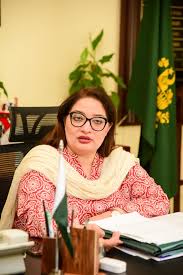Breath Pakistan: regional collaboration urged to combat glacial melt, air pollution at global climate moot

Celina Ali
Islamabad: The first day of the two-day global climate conference, Breath Pakistan, concluded on Thursday with urgent calls for regional collaboration to address the escalating threats of glacial melt, transboundary air pollution, and climate-induced disasters in South Asia.
The conference brought together policymakers, climate experts, and civil society leaders to discuss sustainable strategies for tackling the region’s pressing environmental challenges.
Prime Minister’s Coordinator for Climate Change, Romina Khurshid Alam, proposed the establishment of a South Asian Glacier Research Consortium to enhance regional cooperation on glacier monitoring and disaster response.
She highlighted the alarming retreat of Pakistan’s 7,000 glaciers—the largest concentration outside the polar regions—warning of severe implications for water security and livelihoods.
She emphasized the need to strengthen the SAARC environment action plan, promote transboundary water diplomacy, and secure regional climate financing to support adaptation strategies for communities dependent on glacial waters.
The session on “Glacial Melt – A Sustainable Strategy for the Water Towers of South Asia” saw contributions from experts.
Kanak Mani Dixit, editor of Himal, called for the creation of a “Himalaya-Kindu-Kush Council” to address the accelerating melting of glaciers and permafrost in the region.
He warned that terms like “glacial lake outburst floods (GLOFs)” no longer suffice to describe the scale of the crisis, citing recent disasters in Sikkim, India, and Nepal’s Melamchi River as indicators of an impending catastrophe.
Dechen Tsering, Director of the United Nations Environment Programme (UNEP), underscored the far-reaching impacts of glacial melt, linking it to the triple planetary crisis of climate change, biodiversity loss, and pollution.
She pointed to the devastating 2022 superfloods in Pakistan as an example of intensified monsoon patterns, which have led to widespread health crises, infrastructure damage, and energy insecurity.
Sonam Wangchuk, the renowned Indian engineer and Ramon Magsaysay Award winner, proposed innovative solutions to harness glacial water.
He advocated for the creation of artificial glaciers in high-altitude regions like Ladakh, where water can be refrozen and stored for use during dry seasons. “Height is a great resource—more than oil,” Wangchuk remarked, emphasizing the need to preserve water at its source.
The conference also addressed the transboundary nature of air pollution, with Punjab Senior Minister Marriyum Aurangzeb highlighting the recent smog crisis in Lahore and its regional implications.
She stressed the need for cross-border cooperation to tackle air quality issues, noting that pollution knows no boundaries.
Ellen Mpangananji Thom, WHO’s Deputy Representative in Pakistan, linked air pollution to severe health impacts, estimating that climate change could cause an additional 250,000 deaths annually between 2030 and 2050 due to malnutrition, malaria, diarrhea, and heat stress.
She called for integrating air pollution into broader climate change discussions.
Indrika Ratwatte, the UN’s Special Representative for Afghanistan, emphasized the need for a regional air-quality framework to harmonize standards, monitor cross-border pollution, and coordinate policy actions.
Sunita Narain, Director General of India’s Centre for Science and Environment, advocated for localized solutions to urban air pollution, urging cities to address traffic congestion, coal burning, and waste management.
Meanwhile, Dr. Abid Qaiyum Suleri, Executive Director of SDPI, criticized developed nations, including the U.S., for reluctance in committing to decarbonisation during a panel discussion.
He questioned how countries can balance economic growth with environmental conservation.
Harjeet Singh, Global Engagement Director for the Fossil Fuel Non-Proliferation Treaty Initiative, argued that sustainability must be integrated into all development efforts.
He emphasized the shift from Millennium Development Goals (MDGs) to Sustainable Development Goals (SDGs) as a recognition that economic progress cannot come at the cost of environmental degradation.
As Breath Pakistan enters its second day, participants are expected to focus on actionable strategies for regional collaboration, climate financing, and innovative adaptation measures to safeguard South Asia’s future in the face of an escalating climate crisis.





